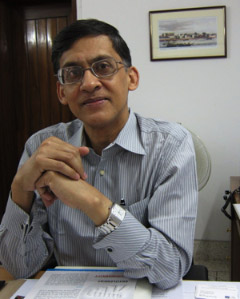9 December 2016, by Manzoor Hasan.

The year 2016 will be remembered for the tremendous political changes that shaped lives and futures all around the world. Throughout this tumult the spectre of corruption – with its ability to undermine trust in political institutions and its far-reaching effects on sustainable development – has never been far from the centre.
This makes the cooperation promoted by the UN Convention against Corruption’s (UNCAC) processes more relevant and important than ever; and the push by the UNCAC Coalition for greater transparency and civil society participation is indispensible to its success.
Second review cycle
As we enter the second cycle of the UNCAC review mechanism important topics are under examination, including public contracting, public sector financial management, private sector integrity and anti-money laundering, as well as asset recovery provisions. On all these subjects, civil society has a contribution to make and the Coalition has been working to support member involvement.
The issues of transparency and participation are central to this second cycle. The word “transparency” is mentioned nine times in chapter II on prevention, which is under review together with chapter V on asset recovery. Participation of civil society is also emphasised in chapter II, notably in articles 5 and 13. This offers an outstanding opportunity for discussions about open and participatory governance.
Changing context and challenges ahead
However, we must also reflect on the challenges ahead and the changing context of anti-corruption advocacy. There is considerable concern in the civil society community that the space available for civic action is shrinking. And it’s important to note that this phenomenon is being felt across the globe, including increasingly in democratic states: almost a half of countries have implemented controls on non-governmental organisations (NGOs) in recent years.
In its 2016 State of Civil Society Report, CIVICUS warns us that, “methods of restriction are manifold,” including restrictions on travel, arbitrary detention, criminalisation and the widespread introduction of legislation on NGO activities. While civic space is shrinking, there is growing awareness of the importance of anti-corruption for tackling our great global challenges: from financial crises, to climate change and sustainable development, solutions to our collective problems are all undermined by corruption in its many forms.
The UN’s 2030 Agenda with 17 goals to change the world includes corruption in Goal 16 on Peace, Justice and Strong Institutions. Many of the corruption related targets map directly onto UNCAC provisions and specifically include reference to accountability and transparency (target 16.6), and inclusive and participatory decision-making (target 16.7).
UNCAC Coalition’s fundamental role
In such a context the UNCAC Coalition has a fundamental role – to enhance solidarity and cooperation among civil society organisations and also to model the positive impact civil society can have in addressing global problems such as corruption. The Coalition’s Transparency Pledge is a practical way to realise this. By emphasising the importance of transparency and public consultation, and providing a means for countries to voluntarily sign up to its six principles, the Pledge is a useful tool for continuing the conversation about the importance of civil society involvement in the UNCAC review processes and the value of its participation more broadly.
Seventeen countries have already signed up to the Pledge – showing both foresight and leadership – but there is a long way to go before establishing the Pledge’s six principles as the general rule in all regions. The UNCAC Coalition Secretariat has developed template letters that Coalition members can adapt for sharing with their governments. I encourage all member organisations whose countries have not yet committed to the Pledge to contact their governments and request that they sign.
Looking forward on International Anti-Corruption Day
Looking forward, the UNCAC Coalition, while aligning its activities to focus on the next round of reviews and ensuring that they are accountable, must also demand that the UNCAC process lives up to its own principles of “participation” and “transparency”.
The role of civil society as a standards setter and watchdog is well established; it can only be strengthened by wider and deeper collaboration across all communities concerned with governance, anti-corruption, human rights and development.
Today on 9 December 2016 – International Anti-Corruption Day – we must come together in our common cause to face the new global challenges of our time. UNCAC Coalition members are resolute in their determination – despite some recent disheartening political developments globally – to achieve the collective gains from participation and transparency and the benefits from implementation of the UNCAC and the 2030 Agenda.
About the author
Manzoor Hasan is Chair of the UNCAC Coalition and Executive Director of the South Asian Institute of Advanced Legal and Human Rights Studies (SAILS).



